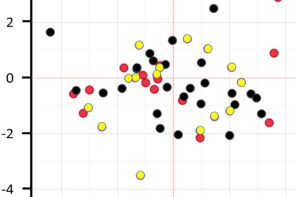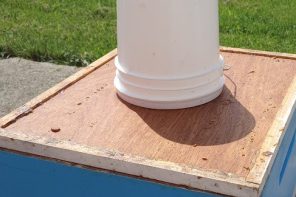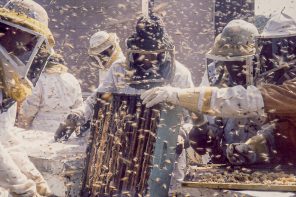Part 1
By: James Masucci
How did a boy who would rather fall off a ladder than get stung by a bee grow up to contemplate becoming a full-time beekeeper? It was a long journey, but once the seed was planted, it was a quick and complete transformation. The journey is common to a lot of beekeepers – you just get hooked. One or two colonies is not enough. The more you learn, the more you want to do. My path has come to a major fork. I am taking early retirement as a successful scientist, and making the leap to a full-time beekeeper. Scary? Yeah. But exciting too. I’m sure I’m not the only one with these thoughts and it’s nice to know you are not alone. So, I’m going to share my story as someone who is in the middle of taking the leap. Who am I? How did I get in this predicament? What decisions do I need to make? Later, I hope to update you on my progress so you can decide for yourself if you want throw away your stable life for a life of daily buzzes and stings . . .
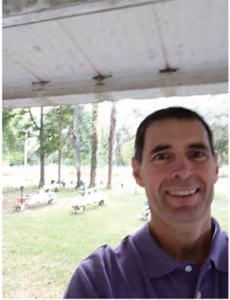
This is a picture of me visiting the University of Florida apiary where I spent a couple of weeks doing research. Only one of the great bee experiences my scientific career has given me.
I grew up in a blue-collar city in upstate NY. My parents were school teachers. I inherited their intelligence, but I was far from an intellectual. My way of studying “bees” was to throw rocks at yellow jacket’s nests and run like mad. I loved being outside and dreamed of living off the land like “My Side of the Mountain” or “The Call of the Wild”. Ultimately, I went to college and, because it was closest to the environment, I got my degree in Biology. From there, a PhD in molecular biology and a post-doctoral fellowship studying root hair growth in the weed Arabidopsis thaliana. After 11 years of post-graduate education, I landed my first job with Monsanto. It was an incredible opportunity to help agriculture. Agriculture, the outdoors, the environment. They are all linked and right up my alley.
I worked happily for 15 years at Monsanto with no trace of bees in my life. I had thought about them though. Remember that dream of living off the land? That never really went away. I gardened, hunted, fished – and beekeeping fits that thought. Produce your own honey. But beekeeping is a lot like fly fishing. It’s hard to get started without knowing someone who does it. My chance came in 2011. I volunteered to help with a field trial that was six hours away. I shared a ride with Tim Fredricks, a guy who had started beekeeping the year before and is currently president of Three Rivers Beekeeping club. We spent 5½ of those six hours talking about bees. By the end of the trip, our plans were set on me becoming a beekeeper. I read some books, built some hives, took a beekeeping course, and ordered two packages.
Having bees does not make you a beekeeper, though. I was successful and grew my two packages to four hives that year and overwintered three (a storm blew over one hive). It took a series of fortunate events over several years for me to become a bonafide beekeeper. It started in 2012 (my first year with bees) when Monsanto purchased the Israeli bee company Beeologics. Along with Beeologics, Monsanto hired Jerry Hayes, a legend in the beekeeping community. Who could ask for a more knowledgeable mentor? I then started helping the Bee Health Team with their field trials. I took trips to fields and worked side-by-side with commercial beekeepers and bee researchers. Walking into yards with hundreds of mating nucs, warehouses full of equipment, and incredible honey houses opened up a whole new world to me.
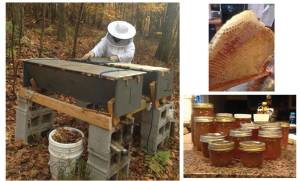
My humble
beginnings started with two top bar hives and a pitcher full of honey. I
remember thinking ‘how much more could a person need?’
It got better. I joined the Bee Health Team and ran their field trials. These were the largest honey bee field trials ever performed and we partnered with some of the best commercial beekeepers in the U.S. and Canada. These guys became my friends. We worked side-by-side in their yards. They shared their know-how and welcomed my questions. We were allies fighting the same pest (Varroa) and they were happy to be a part of it. I took what I learned and applied it to my own bees, eventually developing my own system. This is when I became a true beekeeper. But I also feel “less qualified” as a beekeeper now, than when I first started. These guys, my friends, also opened my eyes to the complexity of bees and beekeeping, and the difficulties of running a bee business. Like with the rest of agriculture, your business is dependent on many things that are out of your control: weather, disease, pests, exposures, and even traffic. My system has been working pretty well, although I know it’s a matter of time before I’m hit with some curveballs. Will I be ready?
If you talk to my wife, this experience has been a double-edged sword. It takes bees to manipulate bees. You want to raise your own queens? You need mating nucs for that. To make the nucs, you need enough hives to establish them. You want to sell splits? You need enough hives to split from. You want a large honey production? You need productions hives as well as “split-able” hives. Fortunately for me, she just rolls her eyes when someone asks me how many hives I have and the number is larger than the time she heard before. What can I say? It’s hard to be working with commercial beekeepers without secretly wondering, “can I do this?”
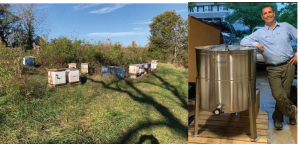
In 2010 I ran ~80 production hives, 30 nucs and produced 4,500 pounds of honey. The question that comes up now is, “how big do I want to get?” I’ve gone from suburban yards with one or two hives to rural yards of 20 and I graduated from an 8/4 extractor to a 20-framer. How many yards will I need? Will I need to build a
honey house? Only time will tell.
I am not a big operation, but every year I’m expanding. Two years ago, I overwintered 33 of 35 hives. I sold a few nucs and produced my first ton of honey in a single year. I had two “real” bee yards (greater than ten colonies) and a few scattered around town. Last year, I overwintered 84 of 89 hives. I sold 25 nucs and produced 4500 pounds of honey in 2020. I carried about 30 nucs for queen rearing, etc. After a mid-summer split and generating 150+ queen cells, I’m going into the winter with 148 colonies with the goal of selling 50+ nucs this spring and producing >6000 pounds of honey. I’m now in 6 “real” apiaries, and have two more lined up for next year. To some, that may sound like a lot, but it is truly a small sideline business. If I’m lucky, I’ll gross $40,000 ($5 a pound for honey and $160 per nuc). From that, you need to subtract equipment, supplies, medications, feed, etc. It’s clear, if I want to be more than a small, sideline business, I need to expand and have a plan.
This year, I maxed out my ability to keep my bees and my day job. Running 100+ colonies took all my spare time and there were times when I had to take vacation days to work my bees. Truth be told, my bees are going into the winter in smaller clusters than I would like because I missed some important feedings. I have to choose between toning down the bee operation or growing it. I was pleasantly surprised by my ability to develop markets for our bees and honey. I ran out of both even though I produced more than twice the amount as last year. Given the new found confidence in my ability to find customers and given the well-timed opportunity to take early retirement, I am taking the plunge. At the end of 2020, my day job is over and I am going to focus on bees. This leaves me with a lot of questions that I need to answer. How big do I want to be? What’s my business model? How much do I invest? Do I get involved in bee research (I am a scientist, after all)? I will provide an update when I have some answers and an idea of how it’s going.






